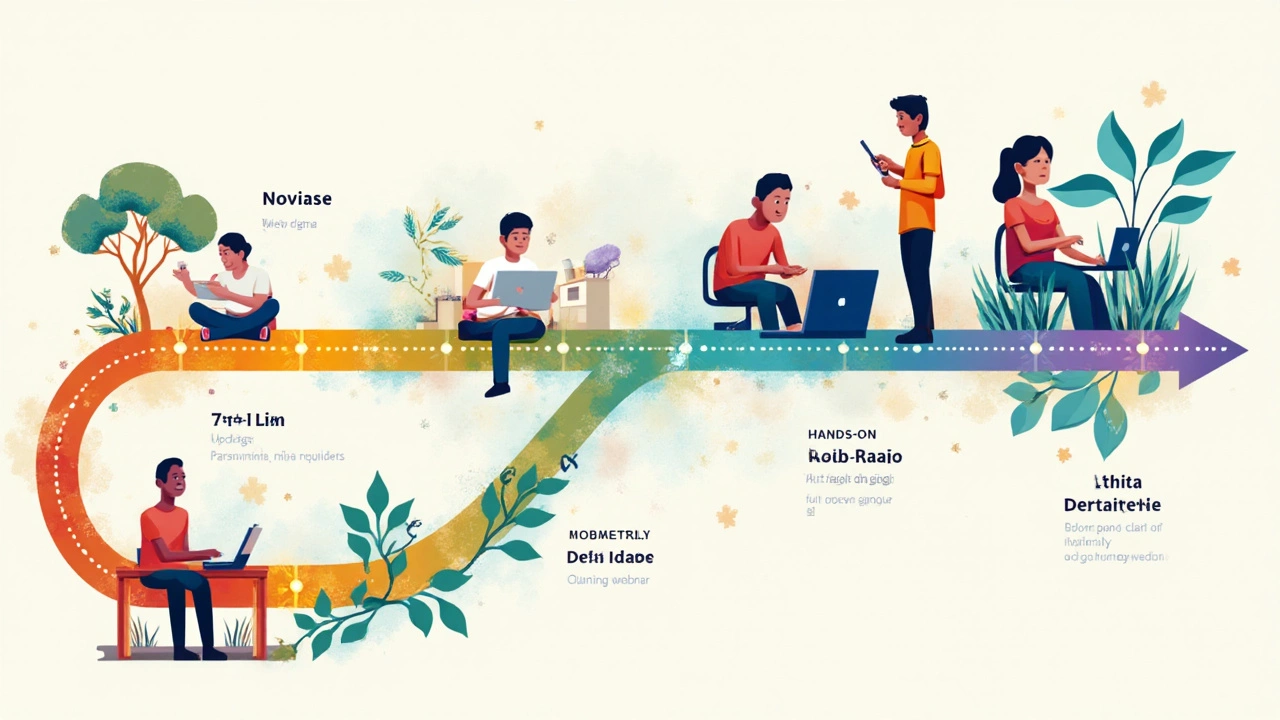The ever-evolving landscape of technology beckons many to dive into coding schools, hopes high and ambitions aplenty. But the journey from novice to proficient coder isn't a one-size-fits-all path. Coding schools, often known for their intense bootcamps, come with varied timelines, each shaped by a multitude of factors.
From accelerated courses aiming to propel you into the tech world within months, to more gradual programs that offer a deeper dive over a couple of years, the spectrum is broad. As you ponder your own coding journey, it becomes essential to understand what affects the duration of these programs and what they entail.
So, whether you're looking to shift careers swiftly or want to pace your learning while balancing other commitments, there's something in the coding school world for everyone. Let’s delve into the different elements of what makes each program tick and see what aligns with your aspirations.
- Different Types of Coding Programs
- Factors Affecting Program Length
- Full-Time vs Part-Time Options
- Choosing the Right Program for You
- Tips for Success in a Coding School
- Understanding Post-Graduation Opportunities
Different Types of Coding Programs
Diving into the world of coding schools presents a fascinating array of options that cater to diverse learning needs and career paths. The choices range from coding bootcamps, which are intense and fast-paced, to collegiate-level courses that allow for a more leisurely learning pace. Coding bootcamps typically race through material within 8 to 12 weeks. These programs are highly concentrated and designed to equip students with the necessary skills for specific tech roles, such as web development or data science. On the other hand, more traditional academic routes, like a bachelor's degree in computer science, span several years and cover a wide array of topics with a broad theoretical understanding.
Coding bootcamps have surged in popularity due to their promise of quick entry into the tech industry. These immersive courses demand a significant time investment daily, often resembling full-time jobs themselves. Their appeal lies in the promise of graduating with tangible, hands-on skills that employers in tech industries value. Many boast impressive job placement rates, though it's vital to analyze these claims critically. Colleges and universities provide a longitudinal study of programming, extending up to four years for an undergraduate degree. They focus on building a solid foundation in computer science principles alongside programming skills, giving students a more versatile knowledge base.
Part-time coding programs offer a valuable alternative for those balancing work or personal commitments. These flexible courses usually extend up to 6 to 12 months, providing the same quality of education at a manageable pace. A significant portion of learners find this option appealing as it allows them to gain tech education without putting their current lives on pause. Online programs have also become a significant part of the learning landscape. With the advent of digital learning platforms, aspiring coders can engage in everything from brief introductory courses to comprehensive full-stack developer packages, all from the comfort of their own homes.
Choosing the right type of coding program can depend heavily on your current skill level, career ambitions, personal schedule, and financial situation. While coding bootcamps may fast-track your entry into the tech world, a degree program might be necessary for more advanced roles requiring deeper expertise. It is crucial to weigh these options with clarity and foresight. A noted industry professional once remarked,
"The path to becoming a competent coder does not hinge on the duration of training, but rather on the depth of understanding one gains along the way."With numerous pathways available, finding your niche in the coding world is not only possible, but exciting.
Factors Affecting Program Length
Delving into the world of coding school durations reveals a myriad of variables that dictate the timeline one might expect. At the forefront of these is the type of coding program itself. Bootcamps, for instance, are renowned for their rigorous, fast-paced approach, often cramming an expansive curriculum into a mere 12 to 24 weeks. These programs are designed to be immersive, expecting students to dedicate full time engagement to their studies and projects. On the other hand, traditional degree programs at universities might stretch over two to four years, balancing theory with practice and providing a more comprehensive educational experience.
Another critical factor is the learning format- whether it is full-time or part-time. Full-time programs undeniably offer a quicker path, ideally suited for those capable of dedicating several hours a day solely to studies and practice. Conversely, part-time programs cater to those balancing work, family, and education, offering a slower pace over a longer duration to accommodate such schedules. According to Course Report, a key player in tracking bootcamp trends, 38% of bootcamp graduates attended a part-time course in 2022, indicating a growing preference for flexible learning. Another contributing aspect is the complexity and depth of the subject matter. Programs focusing on advanced concepts such as machine learning or artificial intelligence might require additional time for mastery compared to courses centered around web development basics.
The instructor's teaching style, resources available, and individual learning speeds also play their parts. Some learners naturally absorb information rapidly and gain proficiency in shorter periods, while others might need additional time and practice. Furthermore, the presence of practical projects and real-world applications can extend the program duration but significantly enhance the learning experience. It’s noteworthy to consider external accreditations and certifications. Programs geared towards providing industry-recognized certifications often stretch their timeline to ensure comprehensive preparation for the exams. Institutions might extend courses to include preparatory modules or mock tests to bolster student success.
Per a 2022 Codecademy report, "Completion rates and time to completion can vary greatly based on the level of support and resources provided by the learning institution. Tailored mentorship and peer interactions are critical components."
In some cases, programs offer career support and internships as part of the curriculum, which may lengthen the time frame but offer invaluable on-the-job training. If we are to factor in these components, it becomes evident how tailored the duration might become based on program-specific and learner-specific factors. Awareness of these varied influences can aid prospective students in selecting the optimal learning path suited to their career goals and life situations, making informed decisions on their educational investments.

Full-Time vs Part-Time Options
When considering a journey into the world of coding, one crucial decision involves choosing between a full-time or part-time program. Both options present distinct advantages and challenges, helping cater to different learning styles and life circumstances. A full-time program is typically more immersive and accelerative, designed for those ready to dive headfirst into their studies and often lasting three to six months. During this intense period, students can expect to commit upwards of 40 hours a week, trying to absorb as much as possible in a short span. This suits those who can dedicate all their energy to fast-tracking their way into a tech career, free from the distractions of other commitments.
On the other hand, a part-time program stretches over a more extended period, generally six to nine months or even longer, depending on the institute and curriculum design. These classes usually occur during evenings or weekends, making them ideal for individuals balancing work or family life. This pace allows students to gradually build their skills while still honoring other responsibilities. Besides, it provides ample time for reflection and practice between sessions, which some learners find increases retention and confidence.
Interestingly, a report from Course Report suggests that bootcamp graduates from either mode of study often find themselves in similar salary ranges post-graduation, indicating that the type of program may matter less than dedication and resourcefulness. Full-time graduates might enter the workforce sooner, but part-time attendees bring their professional experience and maturity that employers appreciate. As one coding school alum puts it,
"The beauty of the part-time program was its flexibility. It allowed me to mesh new knowledge with my day job, turning challenges into learning opportunities".For those yearning to enter the coding field, weighing these options hinges on one's personal situation, learning preference, and career goals. Taking the time to assess these factors ensures a path that is not only effective but also sustainable.
| Program Type | Duration | Commitment per Week |
|---|---|---|
| Full-Time | 3-6 Months | 40+ Hours |
| Part-Time | 6-9+ Months | 10-20 Hours |
Choosing the Right Program for You
Choosing a coding school can be akin to picking the right shoes for a marathon; it requires understanding your own needs, goals, and the fit of the program. With a plethora of options ranging from intensive bootcamps to extended collegiate courses, the decision isn't just about checking boxes but ensuring that your chosen path aligns with your personal and professional aspirations. It's crucial to consider your current life circumstances, including time availability, financial resources, and learning style, when making this decision.
Start with assessing your lifestyle. Are you ready to commit to a full-time immersive experience where you'd eat, sleep, and breathe code? If yes, then a bootcamp might be your ideal choice. These are typically short, often lasting three to six months, and are crafted to thrust you swiftly into the industry. On the other hand, if you’re balancing a job or family commitments, a part-time program might offer a more feasible pathway. These courses often span six months to a year, or even longer, granting more flexibility while still keeping you on the track to becoming a developer.
Money matters too, as costs can vary widely. Bootcamps can be pricey—some reaching upwards of $20,000—though many institutions provide financial aid or income-share agreements. Traditional university programs might offer more affordability through scholarships or financial aid, but they require a longer commitment, both in time and money. Investigating these options thoroughly can save you a lot of stress down the road.
"Choosing a coding program should center around finding a balance between career goals and personal commitments," says Jane Smith, director of TechEd Initiative. "Flexibility and quality are not mutually exclusive; it's about what fits you best."
The curriculum is another pivotal consideration. It's important to evaluate what languages and technologies you aim to learn and how they align with industry trends. Are you eyeing a career in web development with a keen interest in languages like JavaScript or Python? Is data science your calling, necessitating frameworks such as R or TensorFlow? Scrutinize course syllabi carefully to ensure they offer a comprehensive education on the technologies that will benefit your career path the most.
Hands-On Experience and Networking
Besides content, consider the format and mode of education delivery. Programs that offer a mix of theoretical grounding and practical, hands-on projects will often yield the best preparation for real-world applications. Additionally, schools with high industry connections can provide crucial networking opportunities and internships, key for building a career post-graduation. Networking doesn't just help in job searches; it offers lifelong contacts.While choosing, don’t underestimate the power of alumni feedback. Reaching out to past graduates can provide insight into their experiences and outcomes, offering real-world testimonials about the value of the program. Many schools also boast about their job placement rates and success stories. These can give a tangible sense of potential post-graduation opportunities, guiding your decision effectively.
Finally, your motivation and personal goals should steer your choice as much as external factors should. Reflect on whether you are embarking on a new career, looking for a skill-up to enhance existing roles, or simply curious about the tech world. This self-reflection can guide your program selection, ensuring it is not just another course but a step towards the realization of your goals.

Tips for Success in a Coding School
Delving into the world of coding can be both thrilling and intimidating. With the rapid pace typical of many coding programs, navigating your way through successfully requires not just commitment but also smart strategies. For starters, having a clear mindset and goal can sharpen your focus. Reflect on what you aim to achieve during your time in a coding school. Whether it's mastering back-end development or improving your web development prowess, setting specific objectives helps tailor your learning journey.
Another crucial aspect is establishing a study routine. Coding requires practice—lots of it. By dedicating certain hours of your day solely to practice, your brain gets the repetitive input it needs to grasp coding concepts. Carve out a distraction-free environment, be it a quiet corner in your home or a workstation at a local library. It's often helpful to use the Pomodoro Technique, where you break down work into intervals, traditionally 25 minutes in length, separated by short breaks, to maintain productivity and focus without burnout kicking in.
Connecting with peers is another invaluable tip. Networking, not just for job-seeking, serves a more immediate function during your educational stay. Engaging with classmates offers different vantage points; sometimes, a peer's explanation might just be the clarity you need. Besides fostering collaboration, participating in study groups can simulate real-world tech environments and enhance your understanding of collaborative coding. Coding bootcamp environments stress teamwork, mirroring many job settings.
Feedback is gold in tech education. Actively seeking it from instructors or mentors not only identifies your weak points but also strews your path with constructive opportunities to improvise. Speaking of mentors, having a guide in this demanding journey can be your lifeline. A mentor's outside perspective sheds light on unseen growth areas and motivates you to push your limits. According to Jane Smith, a prominent data scientist, "The unceasing feedback loop from mentors transformed my learning from static to dynamic, shedding schooling blind spots I never knew existed."
Keeping a portfolio is another pillar; it's not just your academic calling card but also your reflection in the tech world. Documenting your projects, glitches, and the overall problem-solving process not only showcases your acquired skills but also marks your evolutionary path as a coder. Moreover, potential employers get a tangible sense of your growth and capabilities.
Finally, a common hurdle in coding education—imposter syndrome—deserves acknowledgment. Coding isn't just about getting runs on the board; it's about valuing your growth. Instead of comparing yourself to classmates or industry veterans, measure against your past self. Celebrate the tiniest victory, be it traversing arrays seamlessly or creating your first app. Small wins concrete your confidence, carrying you from code fluency to eventually mastering it.
Understanding Post-Graduation Opportunities
Graduating from a coding school often marks the beginning of an exciting journey into the tech industry. As you emerge from the rigorous yet rewarding confines of the classroom, a host of opportunities unfolds before you. These opportunities vary significantly, depending largely on the type of coding school you've attended and the industry demands. The tech job market is diverse, where roles such as front-end developers, back-end developers, software engineers, and web developers are always evolving, each requiring unique skill sets.
The post-graduation period can be a whirlwind of job applications and interviews. With the growing demand in web development, many coding schools have partnerships with tech companies that streamline the hiring process. Graduates often have the chance to attend exclusive job fairs and networking events, which provide invaluable face-to-face time with potential employers. Impressively, even entry-level positions in the tech industry can offer competitive salaries and opportunities for rapid advancement. However, graduates must be proactive in tailoring their job applications, highlighting specific projects or skills that align with the roles they are aiming for.
"The goal is not just to earn a certificate, but to embark on a career that constantly evolves," says Jane Doe, career expert at TechHire.
For those considering a path of entrepreneurship, the skills acquired in a coding bootcamp can be the building blocks for creating innovative software or launching a web-based startup. With the tech industry booming, new startups are continually emerging, addressing various market needs. Knowledge in coding offers the flexibility and capability to either join a burgeoning company in its early stages or lay down the groundwork for your enterprise.
Many coding schools offer post-graduation support such as mentorship programs, further solidifying alumni's readiness to tackle real-world challenges. These resources are an excellent way for graduates to continue developing their skill sets while receiving guidance from seasoned professionals. In addition, a large number of coding schools maintain active alumni networks, providing former students with opportunities to collaborate, share resources, and stay connected with emerging trends.
To make strategic decisions about your career path, consider engaging with professional communities on platforms like GitHub and LinkedIn. These communities can be gold mines of information, offering advice, collaboration opportunities, and a peek into potential job openings. Some developers find success by contributing to open-source projects, which not only helps refine their skills but also builds valuable connections in the tech community.
It's essential to note that your journey doesn't end at graduation. The field of technology is ever-growing and constantly changing. Continuous learning and adaptability will be your closest allies as you navigate the expansive world of technology. Data from recent surveys suggest that tech professionals who commit to regular learning through workshops, online courses, or advanced certifications tend to advance faster in their careers. This not only boosts confidence but also opens doors to senior positions, where strategic decisions shape the future of technology.
